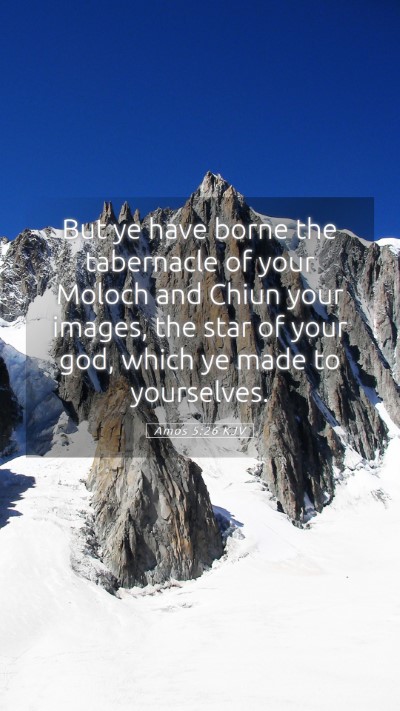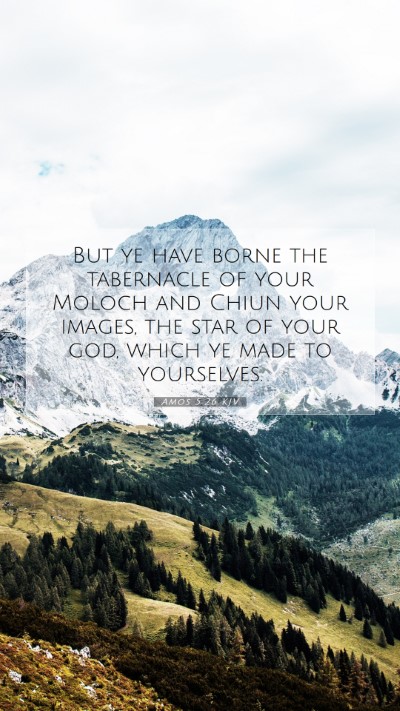Old Testament
Genesis Exodus Leviticus Numbers Deuteronomy Joshua Judges Ruth 1 Samuel 2 Samuel 1 Kings 2 Kings 1 Chronicles 2 Chronicles Ezra Nehemiah Esther Job Psalms Proverbs Ecclesiastes Song of Solomon Isaiah Jeremiah Lamentations Ezekiel Daniel Hosea Joel Amos Obadiah Jonah Micah Nahum Habakkuk Zephaniah Haggai Zechariah MalachiAmos 5:26 Meaning
What is the meaning of Amos 5:26?
But ye have borne the tabernacle of your Moloch and Chiun your images, the star of your god, which ye made to yourselves.
Amos 5:26 Bible Verse Meaning
Understanding Amos 5:26: A Comprehensive Analysis
In this exploration of Amos 5:26, we will delve into its meanings and interpretations by referencing esteemed public domain commentaries from Matthew Henry, Albert Barnes, and Adam Clarke. This verse reads:
"But ye have borne the tabernacle of your Moloch and Chiun, your images, the star of your god, which ye made to yourselves."
Contextual Background
The book of Amos is a cry against the prevailing injustices in Israel and a warning about impending judgment. To understand Amos 5:26, we must consider the historical context in which these words were delivered.
Key Themes in Amos 5:26
- Idolatry: The mention of Moloch and Chiun demonstrates the issue of idolatry and the people's turning away from God.
- Consequences of Sin: Amos underscores the consequences of turning away from Yahweh and embracing false gods.
- Divine Judgment: The verse serves as a reminder that God will judge those who engage in idolatrous practices.
Commentaries on Amos 5:26
Matthew Henry's Commentary: Henry emphasizes the seriousness of idolatry, noting that Israel's embrace of Moloch signifies their abandonment of the covenant with God. He points out that even though the Israelites outwardly participated in religious activities, their hearts were far from the Lord, indicative of a deeper spiritual deterioration.
Albert Barnes' Commentary: Barnes provides an in-depth look at the historical significance of the terms used in the verse. He explains that Moloch represented the pinnacle of apostasy, where sacrifices, including children, were offered in an attempt to appease this false god. Barnes warns that their embrace of these deities indicates a serious breach of their relationship with the true God.
Adam Clarke's Commentary: Clarke elaborates on the symbolic meanings behind the terms 'Chiun' and the 'star of your god'. He highlights that these images reflect a degradation of true worship, where the Israelites substituted divine truth with man-made idols. Clarke sees this as a stern warning of the outcome of such practices, urging the readers to return to authentic worship.
Biblical Exegesis of Amos 5:26
Examining Amos 5:26 through a lens of scripture analysis reveals deep theological implications. The prophet Amos stands as a mouthpiece for divine revelation, calling out the hypocrisy of worship that is not grounded in a true relationship with God. This verse forms part of a larger discussion about the authenticity of worship and relational fidelity to God.
Applications of Amos 5:26
As we seek to apply the message of Amos 5:26 to our lives, we must reflect on the nature of our worship and the idols we may still harbor. This verse invites us to engage in critical self-reflection about what we idolize or place above our relationship with God.
Related Bible Verses
- Acts 7:43 - References the worship of Moloch in a historical context.
- Isaiah 46:1 - Speaks against idols and their inability to save.
- Ezekiel 20:31 - Discusses the consequences of idol worship.
- Jeremiah 7:31 - Highlights the horrific practice of sacrificing children to idols.
Conclusion
Understanding Amos 5:26 requires a multifaceted approach that includes Bible verse interpretations, Bible study insights, and serious consideration of the spiritual condition it reveals. By exploring the insights of renowned Bible verse commentaries, we can deepen our bible verse understanding and apply its lessons to our modern lives.
As you engage with this text, consider joining bible study groups or utilizing bible study tools and bible study materials to further your understanding of Scripture and develop a meaningful relationship with the teachings of the Bible.


